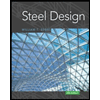Why is the problem is a non-slender member? Is it desirable? Why?
Steel Design (Activate Learning with these NEW titles from Engineering!)
6th Edition
ISBN:9781337094740
Author:Segui, William T.
Publisher:Segui, William T.
Chapter9: Composite Construction
Section: Chapter Questions
Problem 9.8.5P
Related questions
Question
Why is the problem is a non-slender member? Is it desirable? Why?

Transcribed Image Text:Determine the design strength of an ASTM A992 W14 x 132 that is
part of a braced frame. Assume that the physical length L = 30 ft., the ends are pinned and the
column
braced at the ends only for the X-X axis and braced at the ends and mid-height for the
Y-Y axis.
Solution
• Step I. Calculate the effective lengths.
For W14 x 132:
Ix = 6.28 in;
Ty = 3.76 in;
Ag =38.8 in?
K = 1.0 and
Ky = 1.0
L = 30 ft. and
L, = 15 ft.
K,L, = 30 ft. and K,Ly = 15 ft.
• Step II. Determine the governing slenderness ratio
KL/r, = 30 x 12 in./6.28 in.= 57.32
K,Ly/ry = 15 x 12 in./3.76 in. = 47.87
The larger slenderness ratio, therefore, buckling about the major axis will govern the column
strength.
Step III. Calculate the column strength
K,L,
Therefore, (KL),eq =
30
K,L, = 30 ft.
= 17.96 ft.
%3D
I, /Ty
6.28/3.76
From Table 4-1,
for (KL)eq = 18.0 ft. ø.Pa = 1370 kips (design column strength)
Step IV. Check the local buckling limits
For the flanges, b/2tr = 7.14
= 0.56 x
- = 13.5
For the web, h/ty = 15.5
=1.49 x
= 35.9
VF,
Therefore, the section is nonslender. OK.
Expert Solution
This question has been solved!
Explore an expertly crafted, step-by-step solution for a thorough understanding of key concepts.
This is a popular solution!
Trending now
This is a popular solution!
Step by step
Solved in 2 steps

Knowledge Booster
Learn more about
Need a deep-dive on the concept behind this application? Look no further. Learn more about this topic, civil-engineering and related others by exploring similar questions and additional content below.Recommended textbooks for you

Steel Design (Activate Learning with these NEW ti…
Civil Engineering
ISBN:
9781337094740
Author:
Segui, William T.
Publisher:
Cengage Learning

Steel Design (Activate Learning with these NEW ti…
Civil Engineering
ISBN:
9781337094740
Author:
Segui, William T.
Publisher:
Cengage Learning